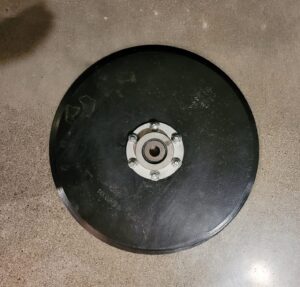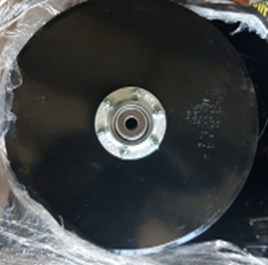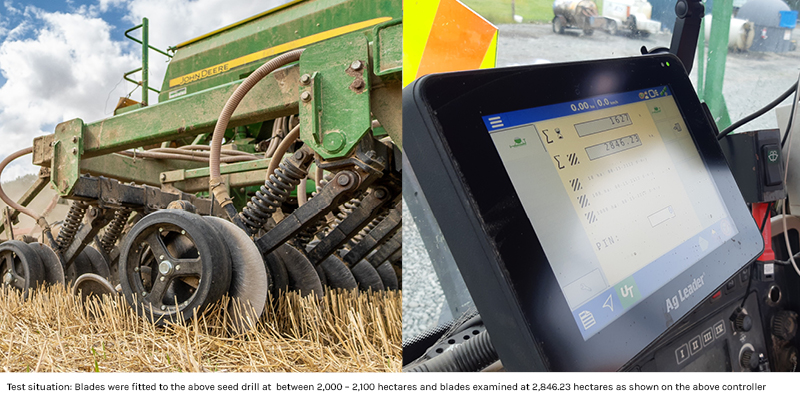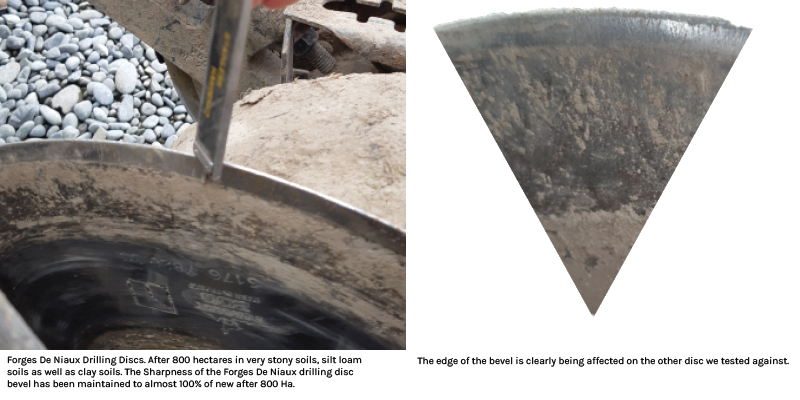31 Aug Are all disks created equal
A comparison
One example is a 13.5” diameter single bevel drilling disc, this is a common size double disc boron steel disc on established triple disc drilling equipment, good examples being Allen Custom™ and Great Plains™ triple disc drills. They are normally replaced as a complete hub and disc assembly as not a lot of hard metal, ground engaging parts importers stock blades only for customers to change blades using existing hubs and new bearings. This typically means farmers or contractors are captive on this part to whoever has the importer agency / or conversely whoever carries stock of an after-market option.
Example: 13.5” Drilling Disc. Complete hub, bearing and disc.
Our custom version looks like this:

One of the in-market options looks like this:

What are the telltale signs we can offer a better value proposition to the market.
- Incumbent HRC 48 – 50 harness versus Forges De Niaux HRC 56 – 58 an area our main source blades are already field proven in..
- Housing quality. Possibility for us to improve!
- Bearing quality. Possibility for us to improve!
+ the most important yardstick of all: Customer research.
Some of our customers were providing us feedback that the bearing holder (or cast housing) wasn’t giving them as much success as they had previously with the earlier Great Plains™ pressed steel flange housing using ¼ inch rivet’s to hold the bearing hub to the 3 mm or 4 mm hard boron steel disc.
As everyone knows a pressed steel housing is still a 1 piece buy and throw away part once the disc is worn. So instead of a relatively inexpensive drilling disc costing you $50 per disc you’re up for almost double that every time seeding discs’ are changed. (Especially once labour is factored in).
Obviously when you import an off the shelf hub like this you are taking a risk on the quality of the bearing compared to machining the hub and hand picking the bearing as a press fit into the housing, in particular the quality of the bearing sealing to cope with fine dust, dirt and grit, working out what is the best practice method of holding the hub to the disc and last but certainly not least what is the disc blade that will maintain the sharpness of bevel for the longest duration.
A big difference between drilling discs and primary tillage discs ‘longevity testing’ is sharpness. With drilling discs this is by far the key measure of performance is how long will the drilling disc hold its edge for.
With a disc on a primary tillage, say heavy offset disc harrow there is various ways that Discs can be tweaked to achieve performance, first up though the bigger the disc the greater the concavity of the blade, its often a combination of disc harrow frame weight, hydraulic cut control – gang angling and the consistent sharpness of the bevel that contributes to performance.
We’ve tested Forges de Niaux blades against another brand of blade
Test Situation: Blades fitted to contracting customers seed drill at between 2,000 – 2,100 hectares and blades examined at 2,846.23 hectares.

Other after-market blades fitted at the same time also in neutral positions along of our blades supplied.

The difference after 800 hectares is visable! The Forges de Niaux blade retained it’s sharpness while the other blade is nicked and soft spots on the bevel of the blade have quickly become dulled, losing its cutting action.
Click here for more information on how Ground Gear can provide the best value soil engaging parts.
If you want to know more, please don’t hesitate to contact us on 0800 894 171 or click here to email us.

